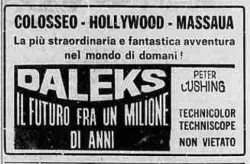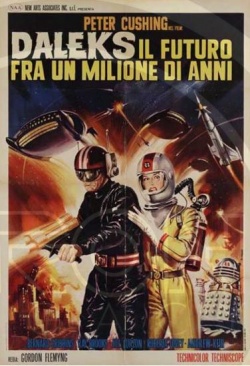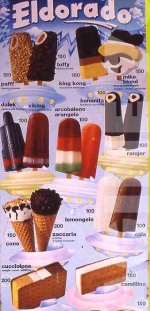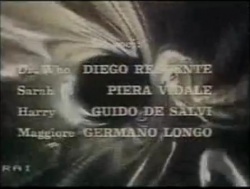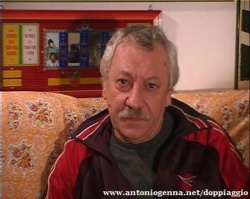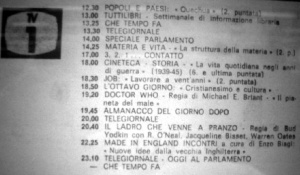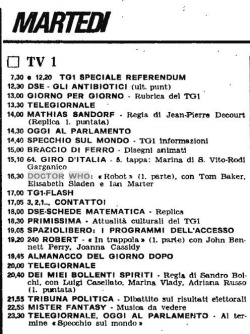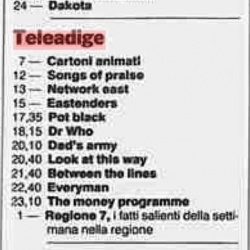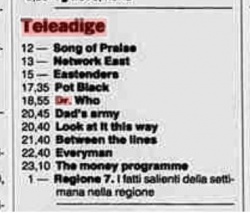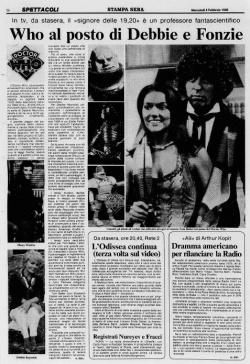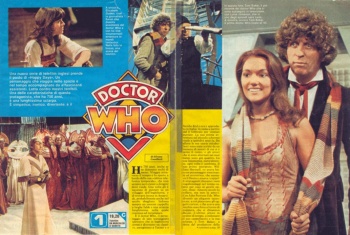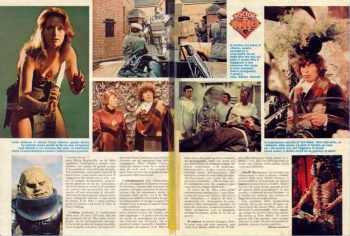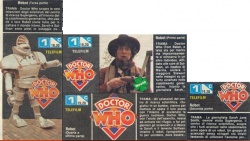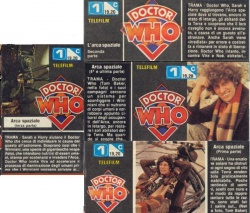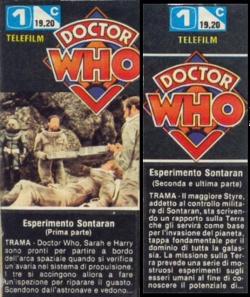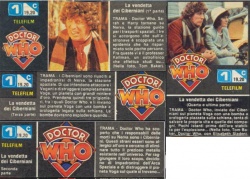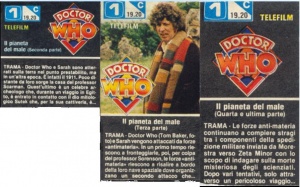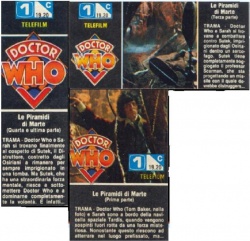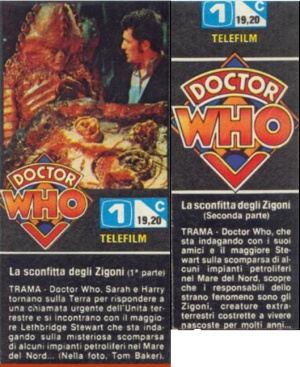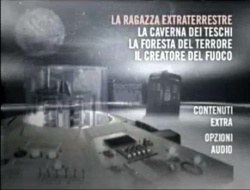Italy
Profile
| Country Number (54?) | 1980 | SECOND WAVE |
| Region | Europe | |
| Television commenced | 1954 | |
| Colour System | 1977 | PAL |
| Population | 1980 | 57 million |
| TV Sets | 1980 | 12.87 million (incl 1.18 million in colour) |
| Language/s | Italian | Dubbed |
Television Stations / Channels
Italy began its television service in 1954.
There are a number of privately-owned stations, but the national broadcaster – and home to Doctor Who – is Radiotelevisione Italia (RAI), also known as "Rete Uno".
All foreign television programmes are dubbed into Italian.
In 1982, RAI acquired a 10% ownership of a Monaco-based Italian-language television station. After the takeover, broadcasts for that station were instead transmitted from Italy. Doctor Who aired on that station in 1983. See the profile for Monaco for further details.
By the early 1990s, the proliferation of satellite stations operating from the UK, such as BBC Prime and Super Channel, meant that Doctor Who in English would also have been available in Italy. In 1992 and 1993 (at least) one of the later Italian terrestrial stations, Teleadige, transmitted BBC signals to Italy. (Refer also to our coverage of these Cable and Satellite stations.)
DOCTOR WHO IN ITALY
Italy was the seventh country in Europe to screen Doctor Who. It was also one of a large group of countries that bought the series towards the end of the SECOND WAVE of sales (see Selling Doctor Who).
And as we've noted in the chapter, 110 Million Viewers, 54 countries had bought the series by then.
But many years before the good Doctor appeared on their television screens, Italians were exposed to Doctor Who in the form of the second of the two Peter Cushing Dalek movies, which screened theatrically in early 1968 – under the title: "Daleks, Il Futuro fra un Milione di Anni" (Daleks – The Future of a Million Years). The film also aired on television a number of times in the late 1970s and in 1980.
In the 1970s, a popular brand of ice-lolly was manufactured by Eldorado. One of the flavoured icecreams was called "Dalek", a name possibly derived from a contraction of the Italian term "da leccare", which literally means "to lick"! The "Dalek" lolly was purple and rocket-shaped. An advertisement for the ice treats, depicted all the lollies standing on "flying saucers", so any link between this product and Doctor Who must be a coincidence.
.
.
BBC Records
The Eighties - THE LOST CHAPTERS, records a sale to Italy of "(9)" stories (by 10 February 1987).
In DWM, Italy is identified in only 2 story Archives: 4E and 4H, in 1979.
However, 4E did not screen. Given that only seven stories aired, the reason for the imbalance could simply be due to 4E and one other story being purchased but not screened, perhaps due to censorship - was the Nazi-like war imagery of the Dalek story considered too strong for the intended audience?
Another possibility is that two of the sales to the other Italian channel (covered under Monaco) have been added onto the seven sold to RAI.
Stories bought and broadcast
TOM BAKER
Seven stories, 26 episodes:
| Code | English Title | eps | Italian Title | Translation |
|---|---|---|---|---|
| 4A | Robot | 4 | Robot | Robot |
| 4C | The Ark in Space | 4 | Arca Spaziale | Space Ark |
| 4B | The Sontaran Experiment | 2 | Esperimento Sontaran | Experiment Sontaran |
| 4D | Revenge of the Cybermen | 4 | La Vendetta dei Ciberniani | The Vendetta of the Cybermen |
| 4H | Planet of Evil | 4 | Il Pianeta del Male | The Planet of Evil |
| 4G | Pyramids of Mars | 4 | Le Piramidi di Marte | The Pyramids of Mars |
| 4F | Terror of the Zygons | 4 | La Sconfitta degli Zigoni | The Defeat of the Zygons |
The programme was supplied as PAL colour video tapes, which were dubbed into Italian.
The opening title sequence was adapted to include the Italian translations of the episode names and writer's credit:
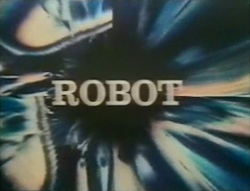 |
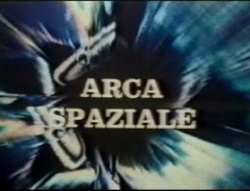
|
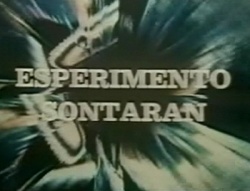 |
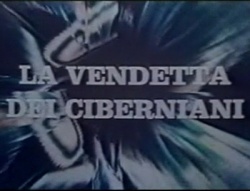
|
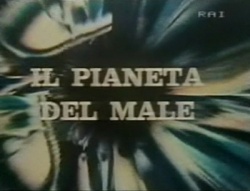 |
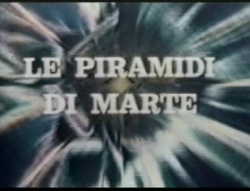
|
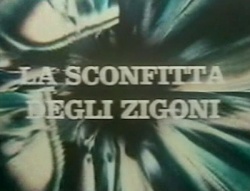 |
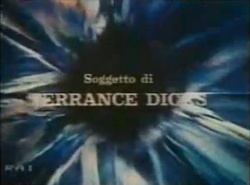
|
- The episodes had new electronic music, although some of the original score was retained, particularly for those scenes without dialogue.
- The closing titles were also recaptioned; only the main cast were given full credits, while the supporting actors were identified but not their character.
- Many of the dubbed Italian episodes are on YouTube:
- In the Italian adaptations, the character of the Doctor is actually called "Doctor Who". The Italian actors who portrayed the lead roles were:
- Diego Reggente (Doctor Who)
- Germano Longo (Brigadier Lethbridge-Stewart)
- Piera Vidale (Sarah Jane Smith)
- Guido de Salvi (Harry Sullivan)
- For a more detailed list of the Italian actors, visit: ITALIAN ACTORS for DOCTOR WHO
And although it is not covered by BroaDWcast, here are details of the voice-over actor for the new series:
PAUL McGANN
TV Movie, 84 minutes:
| TVM | The TV Movie | 1 |
Transmission
TOM BAKER
Although there are nine stories recorded in the 1987 sales document, only seven stories screened.
The series started on Wednesday, 6 February 1980, at 7.20pm.
It aired weekly in the same timeslot for 22 weeks, until 1 March 1980, with Pyramids of Mars. The six stories aired in the correct story order, which was highly unusual, as many foreign broadcasters tended to screen those stories in production code order.
Fourteen months later, on Tuesday, 19 May 1981, a run of repeats aired, at 4.30pm, five days per week, Tuesdays to Saturdays. The repeat run was split into two blocks; the first, consisting of Robot, The Ark in Space and The Sontaran Experiment, ended on Saturday, 30 May 1981.
Then, after a short break (to allow for coverage of a national cycling event akin to the Tour de France), from Tuesday, 9 June 1981, the second block commenced, starting again with Robot. Parts three and four of the serial were pre-empted, to allow for live news coverage of the tragic event surrounding the failed rescue attempt of a trapped child, Alfredo Rampi. As far as can be determined, the two episodes were not rescheduled. The repeats continued the following week, with further repeats of The Ark in Space and The Sontaran Experiment, followed by the first repeat of Revenge of the Cybermen, ending Saturday, 27 June 1981.
Four months later, on Saturday, 3 October 1981, at 12.05pm in the afternoon, the series returned, but now screening only once per week; the first to screen was a new story, the "missing" Zygon serial, followed by a repeat screening of Planet of Evil and Pyramids of Mars.
There were 13 weeks in this run, but only 12 episodes: "La Sconfitta degli Zigoni" is billed for the first five weeks, so presumably for one of those dates the episode was pre-empted.
The series ended on Saturday, 26 December 1981.
Monaco
From 9 November to 14 December 1983 the same seven "Italian" Doctor Who serials aired on another station based in Italy; however since that station had originated in Monaco, we have covered those broadcasts on a separate profile for that country.
Teleadige
During 1992 and 1993 the north-eastern, Trento-based terrestrial channel Teleadige (named after the river Adige), aired programming from the UK via satellite.
We have found only four clear listings – for Sunday, 13 and 20 December 1992, and 3 and 10 January 1993, at 6.15–8.10pm, or 6.55–8.45pm – so it is unknown when this run of episodes commenced or concluded.
The extended timeslot (nearly two hours) suggests these were omnibus editions. We have been unable to determine what episodes these could be, given that there were no omnibus repeats of Doctor Who screening on the BBC or BBC Prime on those dates. There were omnibus editions of William Hartnell stories airing on UK Gold on these dates, so it's possible that that satellite station was the source of these Teleadige episodes – but we are unsure whether UK Gold's coverage extended that far into Europe.
.
PAUL McGANN
The Paul McGann TV Movie aired in 1999 on the (now defunct) Italian pay channel, TVL; this broadcast was in English, without a dubbed soundtrack.
The film was also released on VHS video, which was dubbed into Italian, by these actors:
- Marco Bolognesi (Doctor Who)
- Fabrizio Temperini (Maestro)
- Fabrizia Castagnoli (Grace)
- VIDEO: ITALIAN VIDEO CREDITS
TV listings
| ← AIRDATES ...... (CLICK ICON TO GO TO TABLE SHOWING EPISODE BREAKDOWN AND AIRDATES - N/S = story title is Not Stated) |
TV listings have been obtained from the Rome newspaper Il Tempo, and the online archive of La Stampa.
Listings always gave the series name as "DOCTOR WHO".
The 6 February 1980 issue of La Stampa carried a short introductory article to the series (which featured a photo of Tom Baker and Louise Jameson, despite the latter not appearing in any of the episodes broadcast by RAI.)
In Il Tempo, there were a number of "oddities". On 22 February, the listing given was for La Sconfitta degli Zigoni, but the following week, it was not stated (N/S); but the next two weeks had Il Pianeta del Male; so presumably the Zygon story was dropped in favour of this other serial. (The paper also incorrectly billed Michael E Briant as the director.)
.
The Italian TV Guide, "TV Sorrisi e Canzoni", published its own listings, including a four-page introductory article about the series (which, like La Stampa, also featured photos of Louise Jameson as Leela, despite the fact that none of her stories aired!)
The weekly billings included brief summaries and photos:
.
Italian DVDs
Two DVD box sets of William Hartnell stories were released on DVD in the late-2000s, with Italian duds:
- Doctor Who - Gli Inizi (2007) (The Beginning) (with An Unearthly Child, The Daleks, Inside the Spaceship)
- Doctor Who - I Dalek Invadono la Terra (2008) (with The Aztecs, The Dalek Invasion of Earth, The Web Planet)
- ITALIAN DVD MENUS
The voice-artists were:
- Enrico Maggi (Doctor Who)
- Cinzia Massironi (Barbara)
- Claudio Beccari (Ian)
- Elisabetta Spinelli (Susan)
- For a more detailed list of the Italian actors, visit: ITALIAN ACTORS for DOCTOR WHO
Fandom in Italy
In 1983, the address of the Italian Doctor Who Fan Club was given as via Bologna 33/23, Genova 16127, Italy in the book, Doctor Who – A Celebration.
Today, Italy has a very active online presence; the following are the source of many of the clippings used (with permission) on this site:
- WEBSITES:
- The following websites feature information on Doctor Who in Italy:
And have a look at this music video clip from Italy – especially the last minute…
(Grateful thanks are due to Gabriella for providing the screen-grabs and clippings)
Italy in Doctor Who
- Barbara mentions Hannibal (The Dalek Invasion of Earth).
- Marco Polo's home city is Venice.
- The Romans is set in Italy of AD 64.
- The Animus seizes control of the gold bracelet given to Barbara by Nero (The Web Planet).
- Luigi Ferrigo (played by Gabor Baraker) is a trader from Genoa. Princess Joanna threatens to see the Pope in Rome (The Crusade).
- The Doctor likens the Morok Empire to that of the Roman Empire (The Space Museum).
- The Monk says he once discussed the idea of powered flight with Leonardo da Vinci (The Time Meddler).
- Nero is said to have lived in the First Segment of Time (The Ark).
- Snowcap Base crewman, Tito (Shane Shelton), is Italian (The Tenth Planet).
- Aircraft designs drawn by Leonardo da Vinci feature in The Seeds of Death.
- Leonardo da Vinci is also named in The Underwater Menace, The Masque of Mandragora; the Doctor visits Leonardo's studio in Florence in City of Death.
- Chameleon Tours fly regularly to Rome (The Faceless Ones).
- Wheel Three crewmember, Enrico Casali (Donald Sumpter) is Italian (The Wheel in Space).
- There is a T-Mat station in Rome (The Seeds of Death).
- A legion of soldiers is abducted and placed in the "Roman Zone" to fight in The War Games.
- The Doctor enjoyed a piece of Gorgonzola cheese at Sir Reginald Styles's mansion in Day of the Daleks.
- The Doctor mentions Edward Gibbon's book, The History of the Decline and Fall of the Roman Empire (The Mutants).
- The Doctors wonders whether the Brigadier is Hannibal (Robot).
- Galileo is mentioned by Professor Kettlewell in Robot, and by the Doctor in The Masque of Mandragora and The Sun Makers.
- The Doctor mentions Mount Vesuvius and Pompeii in The Brain of Morbius.
- The Masque of Mandragora is set in San Marino, circa 1492. The story also name-checks the Italian cities of Rome, Florence, Naples, Milan, Venice, and Padua.
- The Doctor mentions Julius Caesar and Tacitus (The Stones of Blood).
- The Doctor mentions Christopher Columbus in The Armageddon Factor. He carries a card with Columbus's name on it in his wallet (The Two Doctors).
- The Roman Empire is mentioned by Mena (The Leisure Hive).
- Rome is alluded to when comparison is made between using humans and Vervoids as slaves (The Trial of a Time Lord).
- The Doctor mentions Michelangelo (Time and the Rani).
